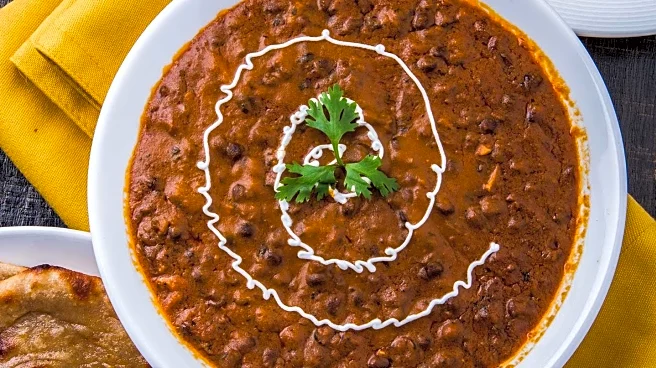What's Happening?
Indian cuisine in the United States is undergoing a significant transformation, moving from traditional curry houses to upscale dining experiences. Executive Chef Vikas Khanna, known for his high-end restaurant Junoon in New York City, has been a pivotal figure in this evolution. Junoon was one of the first Indian restaurants to earn a Michelin star, marking a shift towards sophisticated Indian dining. The trend is further exemplified by Khanna's latest venture, Bungalow, which has become one of the top 10 restaurants in New York City, with reservations selling out rapidly. The rise of upscale Indian dining is part of a broader trend in fine dining, which has seen increased consumer interest post-pandemic. According to data from Datassential, new Indian restaurant openings have increased significantly, with 154 upscale Indian dining establishments now in the U.S., up from 101 in January 2018.
Why It's Important?
The shift towards upscale Indian dining reflects broader changes in American culinary preferences and demographics. As the Indian American population grows and becomes more affluent, there is increased demand for authentic and sophisticated Indian cuisine. This trend is also driven by younger generations, such as Gen Z and millennials, who are seeking diverse and global flavors. The rise of upscale Indian restaurants is attracting investor interest, with private equity firms looking to capitalize on this growing market. This evolution in dining preferences not only enhances cultural diversity in the U.S. culinary scene but also presents new business opportunities for restaurateurs and investors alike.
What's Next?
As the demand for upscale Indian dining continues to grow, more restaurants are likely to explore regional Indian cuisines, offering unique and authentic dining experiences. The Indian Restaurant Association of America has identified hyper-regional flavors as a key trend, with chefs focusing on the diverse culinary traditions across India. This could lead to further expansion and innovation in the Indian dining sector, attracting more investors and diners interested in exploring the rich tapestry of Indian cuisine. Additionally, popular U.K. Indian restaurant chain Dishoom is planning to expand into the U.S., backed by private equity investment, indicating a potential increase in international Indian dining options.
Beyond the Headlines
The rise of upscale Indian dining in the U.S. highlights a cultural shift towards embracing global cuisines and culinary diversity. This trend not only enriches the American dining landscape but also fosters cross-cultural understanding and appreciation. As more Americans become familiar with the nuances of Indian cuisine, it could lead to greater cultural exchange and integration. Furthermore, the success of upscale Indian restaurants may inspire other ethnic cuisines to pursue similar paths, contributing to a more inclusive and varied culinary scene.












